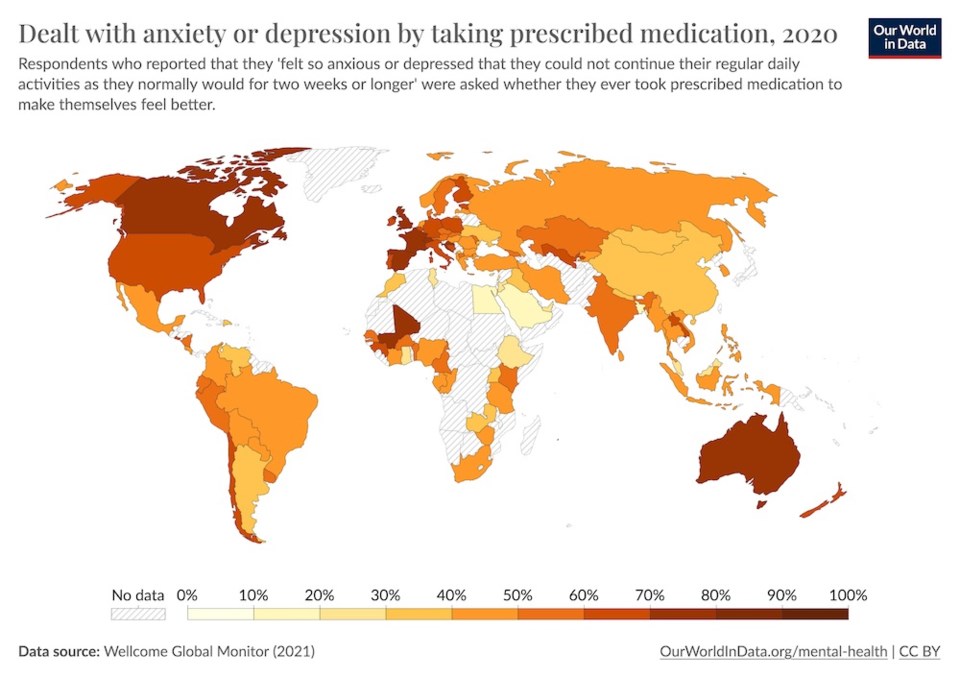Shorter days, thick cloud and black rain do nothing to lift anyone’s mood, least of all the construction workers in southwestern B.C. who face the elements as part of their work. Those with reduced mental wellness could find their well-being under even greater pressure.
While the industry has made strides in creating a friendlier, more supportive environment for workers who are struggling, it’s also pushed up the cost of caring for them. Greater willingness to seek help translates into more money spent delivering the care.
“We’ve done a lot in terms of programs to help start the conversation around mental health, to remove the stigma – particularly in construction, because it’s male-dominated and the traditional culture is to not talk about either your physical pain or mental challenges, but just work through it,” Chris Gardner, president and CEO of the Independent Contractors and Business Association said. “Three years ago we started a mental health program. We offered it free to our members and we’ve got 10,000 people enrolled on it.”
Langley’s Orion Construction Corp. is enrolled in ICBA’s benefit program, with the mental health offerings being of particular interest for its staff of 62.
“What I really like is they’ve expanded the mental health portfolio of offerings,” Orion president Josh Gaglardi said. “In construction, specifically, mental health is not as well profiled as it should be. It’s characteristically a rough-tough industry and I think there’s a long way to go.”
But there’s also a greater acknowledgement of the importance of mental health, with the so-called ‘Great Resignation’ driven in part by people quitting undesirable jobs and seeking healthier work arrangements.
According to surveys by international market research firm Ipsos, mental health has risen to become the leading concern identified by 44 per cent of people globally, up from 36 per cent last year and 26 per cent in 2020. While Google searches for “mental health” peak on World Mental Health Day each October, overall interest is up from five years ago.
But as people began talking about mental health, the demand for care increased.
“There’s definitely greater support requirements since the pandemic, simply in mental health, that I’m seeing in our industry,” Gaglardi said, with leaves of absence for mental health, once the exception, increasingly accepted.
It’s a sign of how much more serious the issues workers experience, and addressing them, have become. “What we’re seeing on the other side of that is the challenge is getting the counselling supports that they need because now there’s a wave of people who say they need help,” Gardner explains.
This has increased demand for counselling resources as well as medication.
Canada prescribes medication to treat anxiety and depression more frequently than anywhere else in the Americas at 73 per cent of cases, according to 2020 data from the Wellcome Trust, a not-for-profit health research institute based in London, England.
With 160,000 workers participating in ICBA’s benefit plans, the costs of those prescriptions add up.
“We have access to a lot of data, and when we look at that data, a number of things are evident. One of them is that in terms of the drugs being prescribed by doctors, the No. 1 category is related to mental health,” Gardner said, including depression, anxiety and ADHD.
Moreover, 40 per cent of long-term health claims are related to mental health.
ICBA doesn’t break out the annual cost of these claims, but they are weighing on employers.
While health and dental benefits can help businesses attract and retain workers in a competitive market, employers are also paying out greater amounts to address diseases such as Type 2 diabetes and off-label use of Ozempic, a diabetes medication now prescribed to facilitate weight loss.
Regular increases in dental costs are also increasing the cost of health and dental benefits, with the BC College of Oral Health Professionals fee schedule rising by an average of 7% in each of the past two years.
“In an effort to both recruit and retain people, contractors have been focused on enhancing the health and dental plan coverage that they offer their employees,” Gardner said. “[But] there’s a lot of cost pressures on those plans which, obviously, are reflected in the rates contractors and other business owners have to pay to provide health and dental benefits to their employees.”



